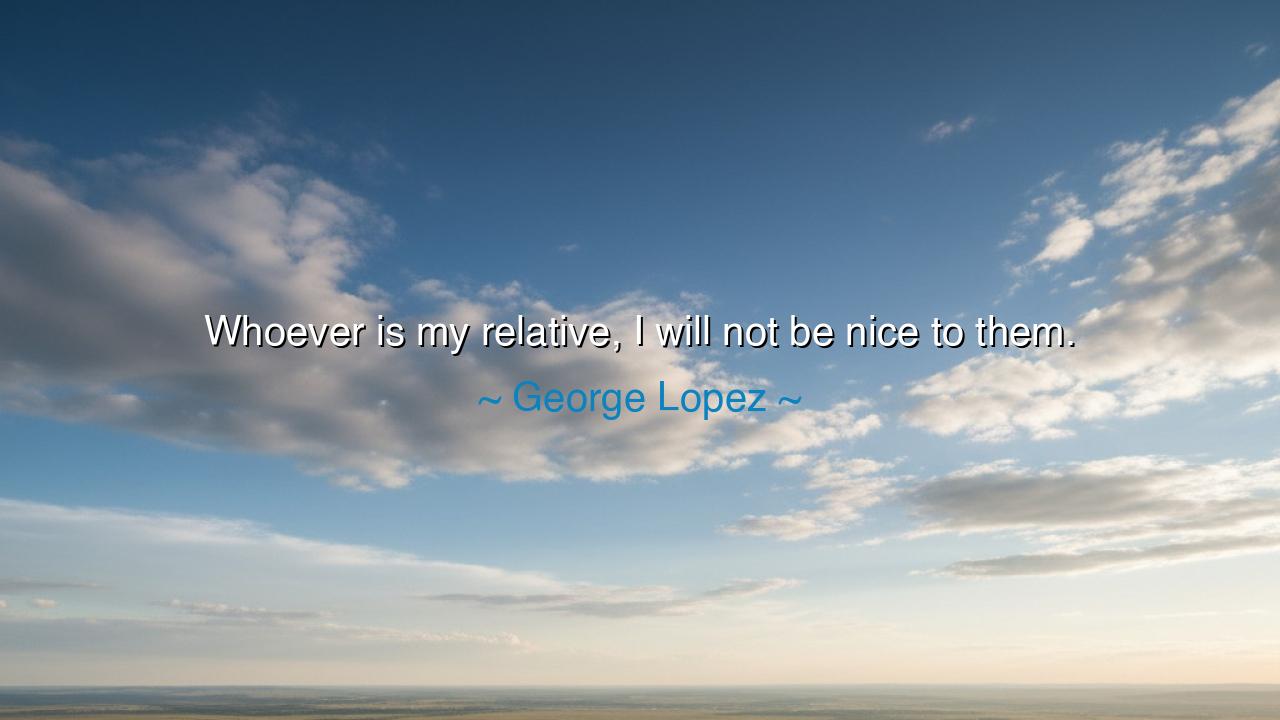
Whoever is my relative, I will not be nice to them.






O Seekers of Truth, gather and hear the wisdom of George Lopez, who in his bold and defiant statement proclaims, "Whoever is my relative, I will not be nice to them." These words, at first glance, may seem harsh or even unkind, but they hold within them a profound reflection on the complexity of family, relationships, and the nature of kindness. Lopez’s words challenge us to reconsider the traditional notion of familial duty and the expectations placed upon us by the bonds of blood. To love and be kind to one’s family—this is a norm in many cultures, but what happens when family itself becomes a source of frustration, burden, or even resentment?
In the annals of history, the family bond has often been seen as sacred. The ancient Greeks wrote of the importance of familial loyalty, of how one’s ancestors gave birth to the very essence of their identity. But they also understood the complexities that arose from these ties. In their epics, we read of brothers and sisters torn apart by jealousy, rivalry, and betrayal—fathers who did not always offer guidance, and mothers whose love came with harsh conditions. The bond of family, while foundational, has never been without its darker undercurrents. Lopez’s words speak to this complexity—acknowledging that family relationships are often far from idyllic.
Let us consider, for a moment, the legend of Orestes, the son of Agamemnon and Clytemnestra, from Greek mythology. Orestes was born into a family cursed by betrayal and murder. His mother, Clytemnestra, killed his father, Agamemnon, in revenge for his sacrifice of their daughter, Iphigenia. Orestes, driven by duty and the need for justice, avenged his father’s death by killing his mother. Here, we see the tension between the duty to one’s family and the inevitable clash with the darker forces within it. Orestes was bound by blood, yet the very blood that connected him to his mother also drove him to commit an act of violence. Such is the paradox of family: it can be both a source of deep love and a wellspring of pain, conflict, and moral dilemma.
In our own lives, how many of us have experienced the weight of family expectations? How often are we told that we must be kind, supportive, and obedient to our relatives, regardless of the circumstances? Lopez’s statement challenges this. He is not advocating for cruelty or disdain toward one’s family, but rather he speaks to the truth that not all familial relationships are built on mutual respect or unconditional love. Sometimes, the ties that bind can become chains, and the kindness that is expected can feel like a burden. In his defiance, Lopez calls upon us to acknowledge that kindness should not be given out of obligation, but rather should flow from the genuine will to give. To love freely, not because one is compelled by family ties, but because one chooses to do so.
In this, there is a lesson of great importance: true kindness must come from a place of authenticity. If we are to be kind, let it be because we genuinely care, not because society or tradition demands it. Family should not be an excuse to treat others poorly, but it should also not be the sole reason we are kind. Kindness born of obligation lacks the purity of selfless giving. It becomes transactional, a favor returned in kind, rather than a gift given freely. To be kind to one’s family, but to do so with the same freedom of choice we extend to strangers, that is where the true value lies.
Let us then reflect upon how we live with our families, both by blood and by choice. Do we love freely, or do we sometimes act out of a sense of duty? Are our actions driven by genuine affection or by the weight of family expectations? Lopez’s words invite us to challenge the conventional wisdom that we must be nice, no matter the circumstances. Sometimes, being honest about the flaws of a family member, or even the limitations of one’s own role within that family, is the most authentic form of kindness we can offer. To acknowledge the complexities of family—to embrace the difficulties, the imperfections, and yes, even the moments when we cannot be kind—may be the most profound act of love we can offer.
Finally, let us take this lesson to heart, Seekers. As you navigate the labyrinth of your own relationships, remember that true kindness comes not from the expectation of reciprocation, but from the freedom of genuine choice. The love you offer must not be coerced. It should be a gift freely given—and sometimes, giving that gift means acknowledging when you cannot offer it. In doing so, you open the door to deeper, more authentic connections, ones that are not bound by tradition or mere blood, but by truth, understanding, and mutual respect. So, be free to love, but love with honesty and authenticity, and may your relationships be more than the sum of their obligations.






AAdministratorAdministrator
Welcome, honored guests. Please leave a comment, we will respond soon